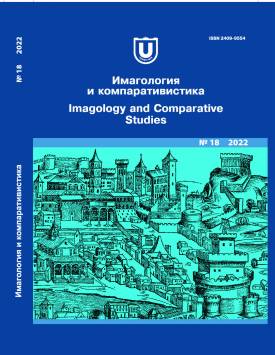The protagonist and his country: A comparative reading of Fyodor Dostoevsky’s The Idiot and Jose Rizal’s Noli me tangere
This essay investigates the parallels between Fyodor Dostoevsky’s The Idiot and Jose Rizal’s Noli me tangere. The focus is typological parallels: authors living in Europe describe a character returning from Europe to his own country. In both novels, the protagonist’s love for his country leads him on a saving mission, which ultimately fails, due to the overwhelming power of death and violence. For both Dostoevsky and Rizal, it remains open whether there could be salvation. Therefore, they use carnivalesque polyphony as their means of expression. The author declares no conflicts of interests.
Keywords
Fyodor Dostoevsky,
Jose Rizal,
Mikhail Bakhtin,
Russia,
Philippines,
salvation,
polyphony,
genderAuthors
| Lipke Stephan M. | St. Thomas Institute | stephanlipkesj@gmail.com |
Всего: 1
References
San Juan Jr., E. (2010) Sisa’s Vengeance: Jose Rizal/ Woman/Revolution. Connecticut, USA: Philippines Cultural Studies Center Publ.
Castroverde, A.C. (2013) Jose Rizal and the Spanish Novel. Dissertation submitted in partial fulfillment of the requirements for the degree of Doctor of Philosophy in the Department of Romance Studies in the Graduate School of Duke University. Durham, N.C.: Duke University.
Bakhtin, M.M. (1984) Rabelais and his world. Transl. by Helene Iswolsky. Bloomington: First Midland Book Edition Publ.
Jackson, R.L. (1984) Introduction. In: Jackson, R.L. (ed.) Dostoevsky: New Perspectives. Eaglewood Cliffs, N.J.: Prentice Hall Publ. pp. 1-18.
Bakhtin, M.M. Problems of Dostoevsky’s Poetics. Translated by C. Emerson. Minneapolis-London: University of Minnesota Press.
Berdyaev, N.A. (2916) Russkaya ideya. Mirosozertsanie Dostoevskogo [The Russian Idea. Dostoevsky: An Interpretation]. Moscow: E-Publ.
Guardini, R. (1994) Chelovek i vera [Man and Faith]. Brussels: Zhizn’ s Bogom.
Holquist, M. (1984) The Gaps in Christology: The Idiot. In: Jackson, R.L. (ed.) Dostoevsky: New Perspectives. Eaglewood Cliffs, N.J.: Prentice Hall Publ. pp. 126-144.
Kasatkina, T.A. (2004) O tvoryashey prirode slova. Ontologichnost’ slova v tvorchestve F.M. Dostoevskogo kak osnova "realizma v vysshem smysle " [About the Creative Nature of the Word. The Ontologicity of the Word in Fyodor Dostoevsky’s Works as Basis for “Realism in a Higher Sense”]. Moscow: IWL RAS.
Novikova, E.G. (2016) "Nous serons avec le Christ": Roman F.M. Dostoevskogo "Idiot" [“Nous serons avec le Christ”: Fyodor Dostoevsky’s Novel “The Idiot”]. Tomsk: Tomsk State University.
Dostoevsky, F.M. (1973) Polnoe sobranie sochineniy v 30 tomakh [The Complete Works in 30 vols]. Vol. 8. Leningrad: Nauka.
Guerrero, L.M. (1974) The First Filipino: A Biography of Jose Rizal. Manila: National Historical Commission.
San Juan Jr., E. (1971) The Radical Tradition in Philippine Literature. Quezon City: Manlapaz.
San Juan Jr., E. (1984) Towards a People’s Literature: Essays in the Dialectics of Praxis and Contradiction in Philippine Writing. Quezon City: University of the Philippines Press.
Gimenez Gaballero, E. (1971) Rizal. Madrid: Publicaciones Espanolas.
Zaide, G.F. (1970) Jose Rizal: Asia’s First Apostle of Nationalism. Manila: Star Book Stores.
Zaide, G.F. & Zaide, S.M. (1984) Jose Rizal: Life, Works and Writings of a Genius, Writer, Scientist and National Hero. Mandaluyong, Metro Manila: National Book Store.
Bulgakova, N.O. (2014) Tvorchestvo Dostoevskogo v perevodakh na frantsuzskiy yazyk [Dostoevsky’s works in French translations]. In: Pesotskaya, S.A. (ed.) Kommunikativnye aspekty yazyka i kul ’tury [Communicative Aspects of Language and Culture]. Vol. 1. Tomsk: Tomsk Polytechnic University. pp. 333-339.
Rizal, J. (1983) Noli me tangere. La Habana: Editorial Arte y Literatura.
Dostoevsky, F.M. (1974) Polnoe sobranie sochineniy v 30 tomakh [The Complete Works in 30 vols]. Vol. 10. Leningrad: Nauka.
Kasatkina, T.A. (2001) Rol’ khudozhestvennoy detali i osobennosti funktsionirovaniya slova v romane F.M. Dostoevskogo “Idiot” [The Role of the Artistic Detail and the Particularities of Word Functioning in Fyodor Dostoevsky’s “The Idiot”]. In: Kasatkina, T.A. (ed.) Roman F.M. Dostoevskogo "Idiot": sovremennoe sostoyanie izucheniya [Fyodor Dostoevsky’s Novel “The Idiot”: Topical State of Research]. Moscow: Nasledie. pp. 60-99.
Dostoevsky, F.M. (1985) Polnoe sobranie sochineniy v 30 tomakh [The Complete Works in 30 vols]. Vol. 28(1). Leningrad: Nauka.
Novikova, E.G. (2014) “Christ beyond the truth” and “truth beyond Christ”: F.M. Dostoevsky and N.D. Fonvizina. Vestnik Tomskogo gosudarstvennogo universiteta: Filologiya - Tomsk State University Journal of Philology. 3(29). pp. 143-152. (In Russian).
Young, S. (2001) Kartina Kholbeyna “Khristos v mogile” v strukture romana “Idiot” [Holbein’s Picture “Christ in the Grave” in the Structure of the Novel “The Idiot”]. In: Kasatkina, T.A. (ed.) Roman F.M. Dostoevskogo "Idiot": sovremennoe sostoyanie izucheniya [Fyodor Dostoevsky’s Novel “The Idiot”: Topical State of Research]. Moscow: Nasledie. pp. 28-41.
Bulgakov, S.N. (1994) Svet nevecherniy: Sozertsaniya i umozreniya [Unfading Light: Contemplations and Reflections]. Moscow: Respublika.
Kaus, O. (1923) Dostojewski und sein Schicksal [Dostoevsky and his Lot]. Berlin: Laub.
Rafael, V.L. (1990) Nationalism, Imagery, and the Filipino Intelligentsia in the Nineteenth Century. Critical Inquiry. 16(3). pp. 591-611.
Lipke, S. (n.d.) El realismo macabro en la novela Noli me tangere de Jose Rizal a la luz del poema Almas muertas de Nikolai Gogol [Macabre Realism in Jose Rizal’s Novel Noli me tangere in the Light of Nikolai Gogol’s Poem Dead Souls]. ActaLiteraria (in print).
Bonoan, R.J. (1996) Rizal’s First Published Essay: El amor patrio. Philippine Studies. 44(3). pp. 299-320.

